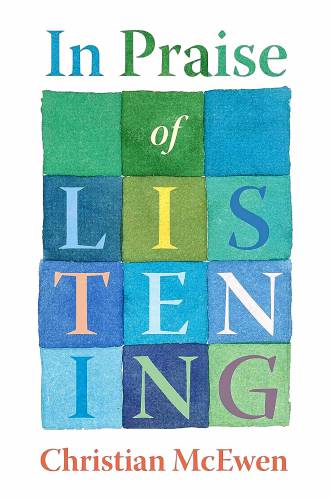Book Bag: ‘Finding Home’ by Gwen Agna and Shelley Rotner; ‘In Praise of Listening’ by Christian McEwen
|
Published: 12-29-2023 9:04 PM
Modified: 01-02-2024 9:08 AM |
Finding Home: Words From Kids Seeking Sanctuary
By Gwen Agna and Shelley Rotner; Clarion Books
Headlines inform us every day of the crises many people face around the world — war, climate disasters, violent crime — that force them to flee their homes. The latest news story concerns a “caravan” in Mexico, reportedly of thousands of displaced people, that’s headed to the southern U.S. border.
In “Finding Home: Words From Kids Seeking Sanctuary,” Gwen Agna and Shelley Rotner have combined forces on a new picture book that examines those issues from a child’s perspective. How does a child say goodbye to a home country and friends, and maybe other family members, and find a new place to live?
“Finding Home,” written by Agna and Rotner, is built around photographs Rotner has taken of children (and some of their family members) who have landed in the region from a host of other countries: Ukraine, Afghanistan, Syria, Nigeria, Haiti and more.
Those children, in direct language based on interviews the two authors conducted, describe what it was like to leave their homes and find their footing in a new land, from learning a new language to making new friends.
“We finally got onto a plane in Afghanistan after walking for two days with very little food or water,” says one young girl. Her family’s journey continued through Qatar and Germany and then to refugee camps in Indiana and Virginia, she adds, “and now our home is in Massachusetts.”
Article continues after...
Yesterday's Most Read Articles
“We left in a hurry,” says one boy. “We could hardly bring anything. I could only take what fit in my backpack.”
Agna is the former principal of Jackson Street School in Northampton, which took in children from a number of other countries during her tenure. Rotner, a former museum educator, is a nonfiction author, photo-illustrator, and photojournalist.
The two combined last year on “True You: A Gender Journey,” a children’s picture book that examined another topical issue: gender identity. Just as they did with that title, in “Finding Home” the authors interviewed and photographed children with their families’ permission, but they have not identified any of the children.
“I want to recognize the power of picture books … in supporting and educating children, families, and educators in the process of making a new home,” Agna writes in an author’s note.
And Rotner says she was struck by the “universal thread of kindness and graciousness” that was shared by the families she met, despite the trauma and dramatic change they’d endured in leaving their original countries.
“It was a gift to for me to share the children’s joy in discovering a playground, playing on a grass soccer field, or going to school and making new friends — just being kids,” she writes.
Indeed, that’s something the children share in their own words, such as the young girl who holds up a drawing she’s made of a box-like house with two windows and a smile; next to it is a girlish figure with stick arms and legs.
“My new school has art class,” she says. “We didn’t have that in my country. I love to draw. This is my happy home.”
“Finding Home,” which will be released Jan. 9, includes additional information for readers, such as a glossary of words about forced emigration, as well as online resources for displaced families.
There will be a launch party for the book Jan. 20 at 11 a.m. at the Eric Carle Museum in Amherst, which will be attended by the children featured in “Finding Home.”
In Praise of Listening
By Christian McEwen;
Bauhan Publishing
About 12 years ago, Williamsburg writer and poet Christian McEwen published “World Enough & Time: On Creativity and Slowing Down,” a series of essays and interviews about the frantic pace of modern life and the value in slowing down — for peace of mind, for sparking creativity, for leaving yourself open to different ideas and thinking.
With her newest book, “In Praise of Listening,” McEwen has written a companion piece of sorts to her earlier title. As she sees it, the value of listening — really listening — to music, to nature, to other people, and to silence, offers another path to gaining a deeper understanding and appreciation of the world around us.
“Listening,” she writes, “can have a far broader and more capacious meaning, moving out beyond the small apparatus of the ears to the hands or belly or enveloping spirit/mind.”
There’s a reason, McEwen notes, that massage therapists talk about “listening to the body” or a gardener might describe how she’s “listening to the land.” In both cases, she says, those phrases can be seen as “an extended metaphor for openness and receptivity, less actual than symbolic, less physical than metaphysical.”
Her new book is divided into 13 chapters, each one made up of short sections, or “essayettes.” In these, McEwen ranges from what she calls “human-centered listening,” such as what children first absorb in their homes, to listening to the sounds of nature, to “professional listening,” such as listening to music.
To do that, the author weaves first-person observation and personal memories with a look at how a wide range of people and professionals such as musicians, many of whom she interviews, have approached these topics.
McEwen notes that Henry David Thoreau, known for the time he spent living in rustic isolation by Walden Pond in Concord, was also a “delighted and surprising listener” who described how, while rowing on the pond one day, he struck his boat with an oar and filled “the surrounding woods with circling and dilating sound.”
And she describes how the small, craggy Isle of Eigg, off the west coast of her native Scotland, boasts a stretch of beach known as the Singing Sands of Eigg (or Traigh na Bigil in Gaelic) that’s a great place to hear the varied voices of nature, sounds that we’re usually too preoccupied to catch.
“The sand ‘sings’ at a right angle to the wind, as one layer is blown or shifted over the layer beneath,” McEwen writes. “Standing on the beach, just above the tide line, your hear what the sound artist Bernie Krause has christened geophony … the earth’s own natural voice.”
“This essential book reminds us of essential things,” writes one critic of McEwen’s new work. “[L]ike the way listening can be a creative advance, not a passive retreat .. and that listening outward can lead to listening inward.”
Steve Pfarrer can be reached at spfarrer@gazettenet.com.



 Overlooked no more: Leverett artist’s woodcut prints celebrate remarkable women of the past
Overlooked no more: Leverett artist’s woodcut prints celebrate remarkable women of the past Arts Briefs: Dance festival and a one-woman play in Northampton, summer music fests in Easthampton, and more
Arts Briefs: Dance festival and a one-woman play in Northampton, summer music fests in Easthampton, and more Speaking of Nature: Capturing my Bermuda nemesis: The Great Kiskadee nearly evaded me, until I followed its song
Speaking of Nature: Capturing my Bermuda nemesis: The Great Kiskadee nearly evaded me, until I followed its song Easthampton author Emily Nagoski has done the research: It’s OK to love your body
Easthampton author Emily Nagoski has done the research: It’s OK to love your body
